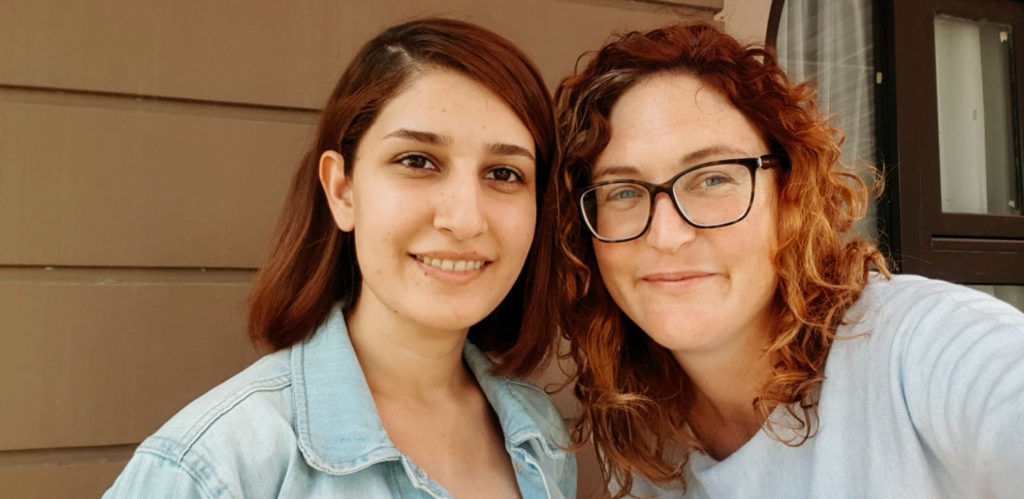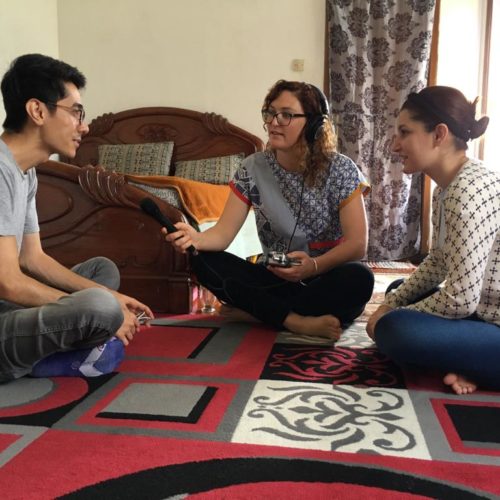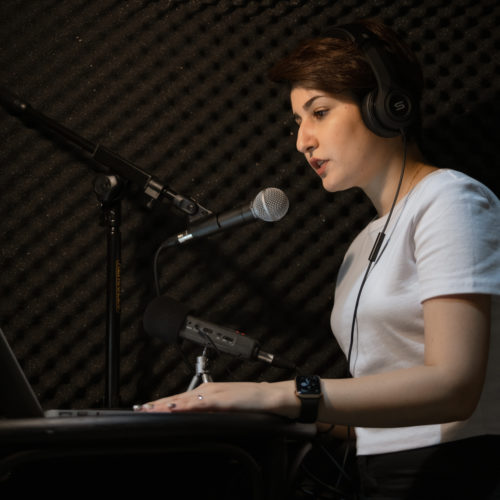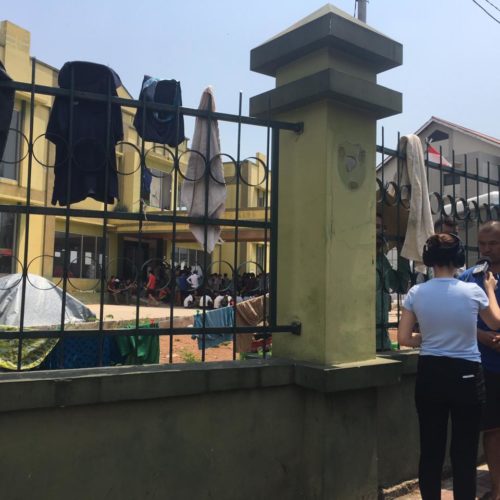Nicole Curby is the producer and co-host of The Wait podcast. Her work has been published by the Guardian, ABC Radio National, The Saturday Paper and Overland. You can follow her on twitter @nicole_curby and find more at nicolecurby.com
In this Working With Sound, Nicole describes the process of collaborating with Mozhgan Moarefizadeh on The Wait – a podcast that uncovers how Australia is pushing its borders out, and the plight of refugees and asylum seekers, like Mozhgan, who are stuck overseas without basic rights.

What piece of audio has had the most profound effect on you – as a listener, as an audio maker or both?
I distinctly remember the moment my friend’s voice came over the car radio, as I sat next to her. We were listening to the Radioactive Show on Melbourne’s 3CR, and my friend was interviewing an elder about a nuclear waste dump on her country. I was struck by how rare it was to hear a voice like that on radio, or anywhere else. She was speaking in her own voice; it was raw and she was uncompromising.
Radio suddenly felt both like magic, and eminently possible. It wasn’t long before I was sitting beside friends in the studio getting my first lesson in audio production. I was hooked. For me, 3CR cracked open the possibilities and freedom of working with sound, and led me into an incredibly diverse and vibrant community. I fell in love with community radio, and I still see a lot of really exciting, challenging, important voices being shared there with care and integrity.
Where else do you find influence or inspiration for your work?
When I’m in the thick of production, I often can’t find the mental space to properly engage with much else. But as soon as that moment passes, I just want to binge on reading novels, watching docos, listening to narrative podcasts. I’m fascinated by other people’s creative choices, and the riskier they are the better! I recently watched Kirsten Johnson’s film Dick Johnson Is Dead, in which she and her ageing father stage his imagined death in a ridiculous multitude of ways, and that becomes a path into a unique and tender conversation about grief. Carrying any creative idea right through to end requires a special kind of belief and confidence, and there was something especially bold and unapologetic about this vision that I find truly inspirational.
Where do you work? And what tools help you the most?
Not far from Wollongong where I live, there’s an old timber mill that’s been converted into dingy art studios. There’s a stinky kitchen out the back, the sound of meandering conversations is constant, bad seventies hits play at low volume, and carpenter’s tools are roaring most days. It’s not an ideal space to make audio! But I share one of the studios with my dear friend Gem and together we create a quiet bubble of impenetrable focus and camaraderie that makes anything possible! Good headphones are essential.
Where did the idea for The Wait come from?
The Wait is a collaboration with Mozhgan Moarefizadeh, a very talented refugee who has been living in Indonesia for seven years. We met when I was in Jakarta as a journalist and I made a half hour program for ABC RN’s Earshot about her and her friend Jafar. Mozhgan and I hit it off and we stayed in touch, even though I’d moved back to Australia. Our long phone conversations were funny, sometimes stressful and sad, and always surprising. I realised that although I had heard so much about refugees and asylum seekers over the years, everything I thought I knew was a world away from Mozhgan’s life and the lives of people around her. I knew nothing about the lives of refugees caught in transit; I didn’t know that many worked as models, others performed slam poetry, and some set up their own schools.
Mozhgan has so much to say, and I knew that I couldn’t keep all these conversations to myself, so we started talking about making something together, although at the time we weren’t sure what it would be. The Wait evolved out of months of conversations and ideas, it is the slow work of genuine collaboration across borders.

What was your favourite part of making The Wait?
Mozhgan introduced me to her family, friends, and her world with incredible generosity. I was welcomed in by the refugee community in and around Jakarta in ways that were both heartwarming and heartbreaking. Hazara women made us epic feasts to sustain long days of interviewing, and vulnerable people unreservedly trusted us with very raw stories.
It feels really good to share these voices. Everyone I met was so keen to speak and we never hear from them in Australia – we barely even know they exist – even though their lives have been fundamentally altered by Australian policies.
I know it was hard for Mozhgan to share her story and collaborate in the production process over several years. But her confidence and belief in the project never flinched. She’s a natural presenter, and she picked up skills as an audio maker quickly, becoming vigilant about sound quality in even the most challenging circumstances.
I’ve collaborated with, and documented Mozhgan’s life for three years, and over that time we’ve developed a very unique and close relationship that has shaped us both in profound ways. I think we’re both really grateful for that.
I also feel incredibly lucky to have worked with co-writer Michael Green and sound engineer Bec Fary, who brought a whole new level of insight and nuance to the project, and transformed it in beautiful ways.

What was the biggest challenge working on The Wait?
The Wait examines the conditions that refugees and asylum seekers in Indonesia live under, and how Australia has actively created that situation. Thousands of people are living with very few rights, and many have been left to languish in shelters that resemble detention centres for the indefinite future. As we were working on the project, we often got news of another suicide, of young people dying because they hadn’t received adequate medical care for years, and almost everyone we spoke to seemed to be deeply depressed.

Mozhgan, her family, and others in the community experienced intense physical and mental health crises while we were making the series. It’s hard to hear the personal impacts of that in minute detail, to have it swirling on repeat in your ears for many months. I feel it’s really important that we bear witness to these lives, but that isn’t easy work.
What’s the best advice you’ve received about podcasting?
Keep the tape running. As soon as you turn the recorder off the gold comes out, so just keep it running!
As an audio maker, what have been your biggest lessons so far?
My background is in oral history so I lean towards sitting down with people and interviewing them at length. When I was recording The Wait in Indonesia, a film maker friend, Tessa Rex joined me for a week. She was always looking for a scene, for action, she captured people’s everyday movements. Watching her was an epiphany for me. When I started recording more tape like this, everything came to life.
What – if anything – do you think distinguishes Australian audio? What would you like to hear more of?
Audio is such a great medium for thoughtful, in-depth documentary, and I would love to hear more of that in Australia. I want to hear a more diverse range of voices and perspectives, and for Australian audio (and journalism in general) to be less insular and more outward-looking, to engage with the region and world that we live in.
Since releasing The Wait, listeners ask me about Mozhgan as if they’re close friends. I love how audio can bring someone you’ve never met into your orbit in a really intimate way and spark connections despite borders, incarceration, distance, and the very real divisions that mark our world.
You can listen to The Wait here.